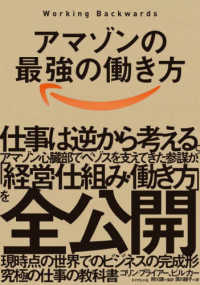Full Description
As the military and intelligence communities re-tool for the 21st century, the long and contentious debate about the role of social scientists in national security environments is dividing the disciplines with renewed passion. Yet, research shows that most scholars have a weak understanding of what today's security institutions actually are and what working in them entails. This book provides an essential new foundation for the debate, with fine-grained accounts of the complex and varied work of cultural, physical, and linguistic anthropologists and archaeologists doing security-related work in governmental and military organizations, the private sector, and NGOs. In candid and provocative dialogues, leading anthropologists interrogate the dilemmas of ethics in practice and professional identity. Anthropologists in the SecurityScape is essential reading for anyone who wishes to understand or influence the relationship between anthropology and security in the twenty-first century.
Contents
Introduction; Chapter 1 The Winds of Politics, Change, and Social Science Transformation in a Military Research Institution, Rebecca Goolsby; Chapter 2 Identity Management in the Federal Government: How an Andean Archaeologist Became a Social Scientist, Charlene Milliken; Chapter 3 Public Anthropology and Multitrack Dialoguing in the Securityscape, Robert Albro; Chapter 4 Blurring the Boundaries between Anthropology and Intelligence Analysis, David Abramson; Chapter 5 Intelligence Work: The Mundane World of High-Consequence Analysis, Mark Dawson; Chapter 6 Interdisciplinary Research in the National Laboratories, Laura A. McNamara; Chapter 7 Standing at the Crossroads of Anthropology, Public Health, and National Security, Monica Schoch-Spana; Chapter 8 Culture in/Culture of the United States Naval Academy, Clementine Fujimura; Chapter 9 Teaching Culture at Marine Corps University, Paula Holmes-Eber; Chapter 10 Protecting the Past to Secure the Future: An Archaeologist Working for the Army, Laurie Rush; Chapter 11 Staying Safe: Aid Work and Security in Afghanistan, Patricia Omidian; Chapter 12 On the Ethics of Graduated Disclosure in Contexts of War, Flagg Miller; Chapter 13 Ethical Considerations from the Study of Peacekeeping, Robert A. Rubinstein; Chapter 14 Hazardous Field Operations: Romanian-American Joint Humanitarian Training, Peter Van Arsdale; Chapter 15 Retaining Intellectual Integrity: Introducing Anthropology to the National Security Community, Jessica Glicken Turnley; Chapter 16 How Critical Should Critical Thinking Be? Teaching Soldiers in Wartime, Anna Simons; con Conclusion, George E. Marcus;








